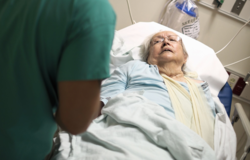 The recent death of a Chicago area nursing home resident with dementia highlights the risks of elopement and wandering that occur when long-term care residents are not properly supervised. When residents with dementia, Alzheimer’s, and other mental impairments are injured or killed as a result of inadequate supervision, nursing homes can be held liable.
The recent death of a Chicago area nursing home resident with dementia highlights the risks of elopement and wandering that occur when long-term care residents are not properly supervised. When residents with dementia, Alzheimer’s, and other mental impairments are injured or killed as a result of inadequate supervision, nursing homes can be held liable.
October Tragedy
In October 2018, Ernestine Booker, a 67-year-old female patient diagnosed with dementia disappeared from a nursing home facility in Bronzeville. She left the facility in the late morning and it is believed she wander the neighborhood until she found herself 2.5 miles away from the nursing home where she resided. Her body was found on October 23rd in front of the Sykes Center which at one point was an outpatient Advocate healthcare center. Investigators determined that she succumbed to hypothermia and passed away shortly after she disappeared.
On the day she disappeared from her nursing home facility, her family notified Chicago police that she was missing. This initiated a citywide search for her whereabouts. While many local residents joined in the search, their efforts proved to be in vain and she was not located until many hours after she had passed.
Causes of Elopement
Elopement and wanderingmay occur when there is a change in the patient’s medication or when the person becomes overwhelmed within a nursing home living situation. Patients can elope when they walk through the wrong door, or when they mistakenly believe they have somewhere they need to go.
The further patients travel from a facility, the greater the risk they face. Nursing home facilities have a duty of care to closely monitor patients so that they are unable to wander away from the supervised care they depend upon. Patients with a history of wandering should be subjected to greater levels of supervision to prevent repeat occurrences. When nursing home facilities ignore patient records in this regard, they negligently place them at risk of serious injury or wrongful death.
Facilities Have a Duty to Prevent Patients from Eloping
For people with Alzheimer’s, dementia, and other mental impairments, facilities have a duty of care that includes proactively implementing safety measures that prevent residents from leaving the facility without supervision. Steps that prevent eloping include positioning of monitored cameras that capture images from stairwells, doorways, sidewalks, and parking lots. Nursing home facilities in Illinois have an installation of alarms on exits and stairwell doors.
The duty of nursing home facilities also includes the use of devices such as bracelets and monitors that notify nursing home staff of patient locations. These monitors should be equipped with sensors that trigger alarms when patients leave facility grounds or enter into restricted areas within the facility. Finally, nursing home facilities are responsible for maintaining sufficient staffing levels so that patients are properly supervised at all times.
When nursing homes fail in any one of these areas, they create a gap within the facility’s security that patients can wander through. In many cases, patients with dementia and Alzheimer’s will meander their way back to places with which they are familiar. These can include favorite shops, beloved restaurants, or even their own homes which can be many miles away. Patients who elope can face serious injury or death before they are located. They can wander into traffic, slip into rivers or lakes, fall off bridges or elevated platforms, and, as was the case with Mrs. Booker, succumb to the elements if they are not promptly located.
Poor Performance is a Warning of Past, Present, and Future Dangers
Recent events highlight the pressing need for enhanced security measures at nursing homes across the state. Many nursing homes have a well-established record of deficient care. These facilities are often chronically understaffed, have records of multiple deficiencies in relation to patient health, and may have multiple pending lawsuits stemming from elder abuse and neglect.
Loved ones of patients with dementia, Alzheimer’s, and other mental impairments should carefully study the records of the nursing home where their loved one resides. These records are harbingers of what may happen if the individual is not removed from the facility. It is rare that patterns of poor performance reverse course and often the safest solution is to simply remove the loved one from the facility’s care and place the person in an alternative living situation within a facility that has a solid record of safety, security, and positive patient outcomes.

